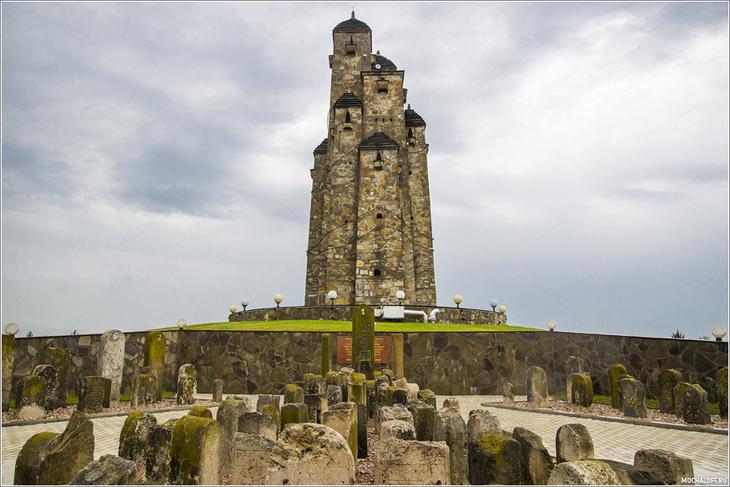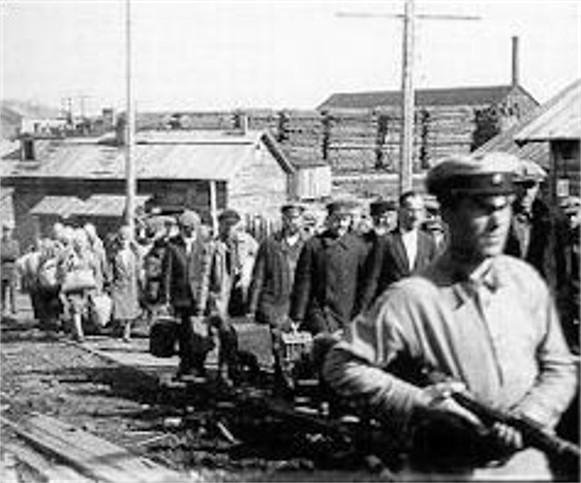Today, the situation may have changed…
The recent decision of the European Court of Human Rights in the case of Drelingas v. Lithuania is, in fact, revolutionary because it basically expands the scope for the term “genocide”.
Is punishment inevitable?
Commenting on the trial of Nazi criminal Adolf Eichmann (one of the organizers of the Holocaust, tried and executed in Israel in 1962), the famous philosopher Karl Jaspers wrote:
“Something other than law is at issue here and to address it in exclusively legal terms is a mistake.”
Similar thoughts are regularly heard when it comes to taking court decisions as a means of establishing historical truth or, in other words, trying to write a history textbook in the courtroom.
However, better options have not been invented. Hence, criminal liability for such crimes as genocide, crimes against humanity, war crimes and, with certain reservations, crimes of aggression, is well-rooted on both national and internationally levels.
There is no statute of limitations for criminal liability, but the International Criminal Court (ICC), created in compliance with the Rome Statute of 1998, is intended to complement existing national judicial systems when national courts are unwilling or unable to prosecute criminals or when the United Nations Security Council or individual states refer situations to the Court. In practice, a large number of serious crimes against international law committed after the creation of the ICC (in particular, in Ukraine after 2014) remain unpunished, and it is difficult for specialists to find persons that are confident in the victory of international justice in the short run.
One way or another, the international community now has a tool for reviewing new crimes against humanity.
However, many nations remain deeply traumatized by crimes of the past, and without addressing them, some countries simply cannot move forward.
This is one of the most difficult tasks facing countries that were part of the former Soviet Union.
There are three reasons. First, the USSR is accountable for an incredible number of the most brutal and massive crimes against its own citizens and entire nations that were part of it.
Secondly, it is complicated to establish such historical data due to the efforts of Soviet authorities to hide the truth (aggressive imposition of myths and lies, destruction of documents and witnesses, etc.), and also due to the current position adopted by the Russian Federation, which sees itself as a continuation of “glorious Soviet history” and spares no efforts to whitewash its image.
Thirdly, modern wording describing the most serious crimes, such as genocide, was created after the Second World War, with the direct involvement of the USSR and the Western powers, who carefully worded the corresponding definitions to suit Nazi crimes, but made it more difficult to apply to their own crimes. The first draft of the Convention included political killings, but the USSR along with some other nations would not accept that actions against groups identified as holding similar political opinions or social status would constitute genocide, so these stipulations were subsequently removed in a political and diplomatic compromise.
Is it genocide?
Thus, the 1948 Genocide Convention was passed to outlaw actions similar to the Holocaust by Nazi Germany, but it is more problematic to apply it to massive Soviet repressions (or to crimes perpetrated by British colonialists against the Hindus in India or by American settlers against Native Americans).
The Convention on the Prevention and Punishment of the Crime of Genocide, adopted on December 9, 1948, defines genocide as an action committed with intent to destroy, in whole or in part, a national, ethnic, racial or religious group. Most importantly, this definition of the crime of genocide excludes acts of mass extermination due to people’s political convictions, social status, property status, etc.
At this moment, I cannot but mention that well-known thesis of Russian propaganda that the Holodomor, “even if it was specially organized”, was NOT directed against Ukrainians (a national/ethnic group), but only against peasants (a social group) - and therefore, it should not be considered a genocide.
But, let’s return to the Lithuanian case that was considered by the ECHR.
After the return of Lithuania under the control of the Soviet Union in 1944, a partisan liberation war spread throughout the country. According to data provided by the Lithuanian government to the ECHR, until 1953 about 500,000 Lithuanians suffered from Soviet repression (total population of Lithuania as of 1939 - 2,925,271 persons).
The brutality and violence used by the Soviet authorities to destroy members of the partisan movement is quite impressive. The Soviet authorities wiped out thousands of Lithuanian partisans and sympathizers in 1940-1941 and in 1944-1953 (about 20,000 people were killed); their supporters and family members were imprisoned or deported to Siberia; mass torture, intimidation and collective punishment were used, including the burning of entire villages.
When Lithuania declared independence, the actions and operations attributed to the Soviet Union were qualified as genocide.
In 1992, Lithuania passed a special Act providing for the responsibility for the genocide of the Lithuanian people. Section 1 of the Act defined genocide, broadly following the definition of the Genocide Convention. Section 2 added that “killing and torturing the people of Lithuania, deportation of its population carried out during the years of Nazi and Soviet occupation and annexation of Lithuania corresponds to the definition of the crime of genocide as it is described by international law”. The crime of genocide was incorporated into the Criminal Code in 1998. The definition of the offence referred to “actions committed with intent to physically destroy, in whole or in part, residents belonging to a national, ethnic, racial, religious, social or political group”.
At the same time, the crime of genocide, along with other crimes against international law, was included in the list of exceptions to the law prohibiting retroactive application of criminal law. This made it possible to raise the issue of the criminal liability of several veterans of the Ministry of State Security who participated in operations to exterminate Lithuanian partisans and remained in Lithuania after independence.
These cases were investigated by Lithuanian courts, which proceeded to find the veterans of Soviet security agencies guilty of the crime of genocide.
Unpunished crimes
Of course, the individuals convicted of crimes committed during the Soviet era did not recognize their guilt and used all possible means to appeal the sentences.
The first such case submitted to the ECHR - Vasiliauskas v. Lithuania - was considered by the Grand Chamber of Justice on October 20, 2015.
After examining the arguments of the applicant and the Government of Lithuania, as well as the Russian Federation, which took advantage of the right to support the applicant, the Grand Chamber of the ECHR, by a majority of votes (9 against 8), found that Lithuania had violated Article 7 of the European Convention on Human Rights, which states that “the criminality of an act and punishability of a person shall be determined by a criminal law in force at the time of the commission of that act.” (nullum crimen sine lege).
In other words, the state is entitled to codify a wider interpretation of the crime of genocide than that stipulated in international law at the time of its commission, but such a crime may not be punished retroactively.
Two weeks after this decision, Vytautas Vasiliauskas died. At the request of his family, the Supreme Court of Lithuania reopened the proceedings, abolished previous court decisions and decided that the charges against Vasiliauskas should be reformulated. But, seeing that the applicant had died, the case was closed. The Committee of Ministers of the Council of Europe then ruled that Lithuania had fully complied with the ECHR judgment in the Vasiliauskas case.

Meanwhile, Lithuania continued to prosecute former Soviet security officers for the crime of genocide. On April 12, 2016, the Lithuanian Supreme Court upheld the sentence of genocide for another former KGB officer - Stanislovas Drelingas, who was prosecuted for his participation in a KGB operation that resulted in the capture of Adolfas Ramanauskas, code name Vanagas, one of the last leaders of the Lithuanian partisan resistance to Soviet rule.
On April 12, the plenary session of the Supreme Court of Lithuania unanimously upheld the previous judgment, that Drelingas was guilty as a participant in the genocide directed at Lithuanian partisans, a separate political group, who were held to have been a substantial part of Lithuanian nation or ethnic Lithuanians, thus a group protected by the Genocide Convention of 1948.
Despite the comparatively short term of punishment (taking into account his poor health and secondary role in the capture of Adolfas Ramanauskas, Drelingas was sentenced to only five months in prison), Drelingas also submitted his case to the ECHR.
Historical decision
The ECHR’s final decision in Drelingas v. Lithuania was promulgated on March 12, 2019.
This time, the relevant Chamber of the Court (the Fourth Section under the chairmanship of Ukrainian judge Hanna Yudkivska) did not refuse to consider the case in favour of the Grand Chamber, but issued a significant decision.
With five votes against two, the Chambers decided that Drelingas’s condemnation did not violate Article 7 of the Genocide Convention, i.e. the article that had allowed the previous applicant - Vytautas Vasiliauskas – to win his case.
The Court concluded that:
“Lithuania’s Supreme Court had now resolved previously existing legal discrepancies in domestic practice on such genocide trials, discrepancies which had led to the Court finding a violation in the similar case of Vasiliauskas v. Lithuania in 2015.
In particular, the Supreme Court had explained why the partisans who had resisted Soviet rule could be considered as an important part of the nation and thus be covered by international law, Article II of the Genocide Convention, at the time of the events.
The applicant had to have been aware in the 1950s that he could be prosecuted for genocide and his conviction had been foreseeable. There had therefore been no violation of the Convention.”
Judges Motoc and Ranzoni expressed dissenting opinions.
Romanian judge Iulia Antonoelli Motoc was particularly critical of the decision:
“The implications of this ECHR judgment, which is unprecedented in international practice, are fundamental. For the first time, an international judicial institution has recognized ethnic and political genocide. Today, many countries are discussing such genocides.
Once the ECHR recognizes genocide for “ethnic and political” reasons, other states will be tempted to follow Lithuania’s example.
By adopting such a decision, the Court is expanding the scope of genocide far beyond the frame defined in today’s international criminal law.”
According to judge Motoc, the case must now be brought before the Grand Chamber. It appears that this scenario is quite plausible as the applicant plans to appeal against the Court’s decision. However, even if the Great Chamber of the ECHR considers this case, the results are quite difficult to predict.
If there are no changes to this important decision, the path to a freer retrospective interpretation of the crime of genocide will be open.
In conclusion, the ECHR has closes the impunity gap that allowed defenders of totalitarian regimes to justify crimes by hiding behind purely formal arguments.
But, we must admit that practical consequences from the point of view of criminal law, as in the case of Soviet crimes during Stalin’s rule, will be rather limited.
In fact, in order to establish criminal liability, the subject must be alive; moreover, there have always been many other legal obstacles preventing good historical and political analyses and evaluations of past events as genocide.
However, this historic decision may open the door to the investigation and condemnation of later crimes perpetrated by the Soviet authorities, even if they were not as massive.
In any case, there is one thing that should be avoided at all costs: banalization of the crime of genocide.






